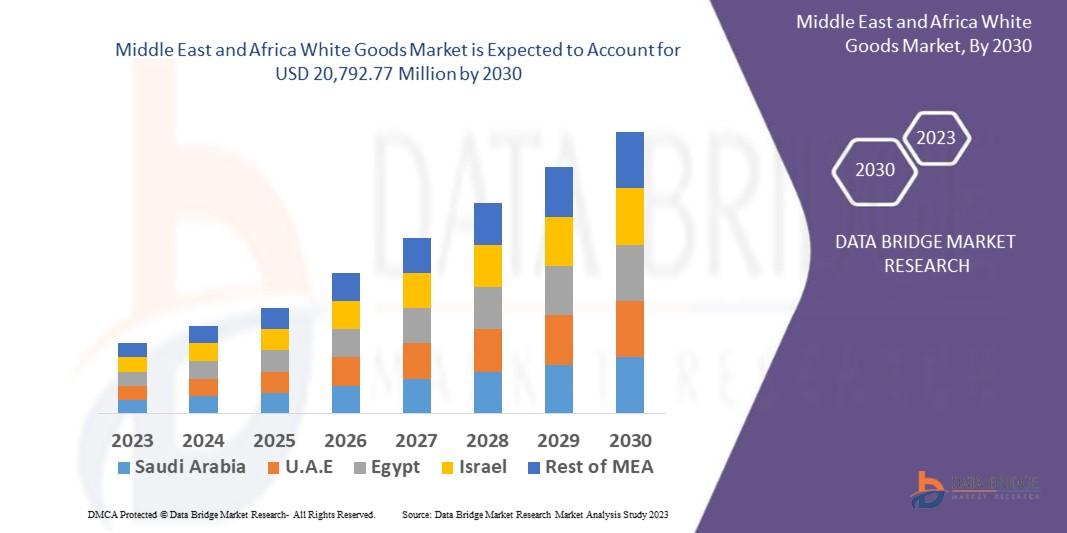The Middle East and Africa white goods market is experiencing strong growth driven by rapid urban development, rising disposable income, and the increasing adoption of smart home appliances.
The Middle East and Africa White Goods Market size was valued at USD 33.54 billion in 2024 and is projected to reach USD 50.55 billion by 2032, with a CAGR of 5.26% during the forecast period of 2025 to 2032.
As consumers shift toward energy-efficient white goods, demand for advanced household appliances such as refrigerators, washing machines, dishwashers, and air conditioners is rising across Saudi Arabia, UAE, South Africa, Egypt, and Nigeria.
Market Overview
The white goods market in the Middle East and Africa includes large household appliances such as:
-
Refrigerators & freezers
-
Washing machines & dryers
-
Air conditioners
-
Dishwashers
-
Ovens & cookers
Growth is supported by:
-
Urbanization and housing development
-
Increasing demand for smart and connected appliances
-
Energy efficiency regulations
-
Growth in retail and e-commerce sales channels
The MEA region’s climatic conditions also drive strong demand for cooling appliances and energy-saving technologies.
Market Size & Share Insights
The MEA white goods market size is expanding due to:
-
High replacement demand
-
Smart appliance adoption
-
Expansion of residential and commercial infrastructure
-
Rising awareness about energy-efficient white goods
GCC countries—especially Saudi Arabia and UAE—hold the largest market share, while African nations like South Africa and Egypt show rapid growth in mid-range and premium appliance categories.
Key Market Drivers
1. Rapid Urbanization and Lifestyle Changes
Increasing construction of residential spaces is boosting sales of essential home appliances.
2. Demand for Energy-Efficient Appliances
The region’s hot climate increases interest in inverter air conditioners, efficient refrigerators, and low-power washing machines.
3. Growth of Smart Home Technology
Consumers are increasingly adopting IoT-enabled white goods, including smart refrigerators, connected washers, and voice-enabled ovens.
4. Expansion of E-Commerce
Online retailers offer competitive prices, installation services, and warranties—accelerating adoption across the region.
Market Challenges
Key challenges in the Middle East and Africa white goods industry include:
-
High import dependency
-
Currency fluctuations
-
Limited distribution in rural areas
-
Uneven electricity infrastructure in several African regions
Manufacturers are responding through localized production and region-specific product innovation.
By Product Type
-
Refrigerators and Freezers
-
Washing Machines and Dryers
-
Air Conditioners
-
Dishwashers
-
Cookers and Ovens
-
Other large appliances
Refrigerators and air conditioners dominate due to climate and household necessity.
By Distribution Channel
-
Online Retail
-
Hypermarkets & Supermarkets
-
Specialty Stores
-
Direct Sales
Online retail is the fastest-growing channel thanks to digital shopping adoption.
By End User
-
Residential
-
Commercial (Hotels, Offices, Hospitality, Healthcare)
Residential users contribute the majority of demand.
By Country
-
Saudi Arabia
-
United Arab Emirates
-
South Africa
-
Egypt
-
Nigeria
-
Rest of MEA
The UAE and Saudi Arabia lead in premium smart appliances, while African nations show high potential for mid-range appliances.
Competitive Landscape
Leading companies operating in the MEA white goods market include:
-
LG Electronics
-
Samsung Electronics
-
Haier
-
Electrolux
-
Bosch
-
Hisense
-
Midea Group
-
Whirlpool
These brands are focusing on:
-
AI-powered appliances
-
Energy efficiency
-
Smart connectivity
-
Improved durability
-
Antimicrobial technology
Future Outlook & Forecast (2024–2031)
The Middle East and Africa white goods market forecast suggests steady growth driven by:
-
Smart city initiatives
-
High demand for connected and energy-efficient appliances
-
Expansion of residential projects
-
Increased investment by global manufacturers
Emerging trends such as AI-driven home appliances, voice-controlled devices, and automated household systems will shape future demand.
Browse More Reports:
Global Horticulture Lighting Market
Global Polyvinyl Chloride (PVC) Compound Market
Global Dental Chairs Market
Global Makeup Remover Market
Global Taurine Market
Global Database Security Market
Global Corrugated Packaging Market
Global Small Wind Market
Global Caffeine Supplements Market
Global Locomotive Market
Global Molecular Breeding Market
Middle East and Africa White Goods Market
North America White Goods Market
Europe Unmanned Surface Vehicle (USV) Market
Middle East and Africa Treasury Software Market
Conclusion
The MEA white goods market presents significant opportunities as consumers prioritize energy savings, convenience, and smart technology. With strong urbanization, rising incomes, and rapid digital transformation, the market is expected to witness healthy growth over the next decade.
Contact Us:
Data Bridge Market Research
US: +1 614 591 3140
UK: +44 845 154 9652
APAC : +653 1251 975
Email:- corporatesales@databridgemarketresearch.com


